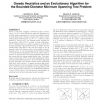Free Online Productivity Tools
i2Speak
i2Symbol
i2OCR
iTex2Img
iWeb2Print
iWeb2Shot
i2Type
iPdf2Split
iPdf2Merge
i2Bopomofo
i2Arabic
i2Style
i2Image
i2PDF
iLatex2Rtf
Sci2ools
149
click to vote
SAC
2003
ACM
2003
ACM
Greedy Heuristics and an Evolutionary Algorithm for the Bounded-Diameter Minimum Spanning Tree Problem
Given a connected, weighted, undirected graph G and a bound D, the bounded-diameter minimum spanning tree problem seeks a spanning tree on G of lowest weight in which no path between two vertices contains more than D edges. This problem is NP-hard for 4 ≤ D < n − 1, where n is the number of vertices in G. An existing greedy heuristic for the problem, called OTTC, is based on Prim’s algorithm. OTTC usually yields poor results on instances in which the triangle inequality approximately holds; it always uses the lowest-weight edges that it can, but such edges do not in general connect the interior nodes of low-weight boundeddiameter trees. A new randomized greedy heuristic builds a bounded-diameter spanning tree from its center vertex or vertices. It chooses each next vertex at random but attaches the vertex with the lowest-weight eligible edge. This algorithm is faster than OTTC and yields substantially better solutions on Euclidean instances. An evolutionary algorithm encodes ...
Related Content
| Added | 05 Jul 2010 |
| Updated | 05 Jul 2010 |
| Type | Conference |
| Year | 2003 |
| Where | SAC |
| Authors | Günther R. Raidl, Bryant A. Julstrom |
Comments (0)

